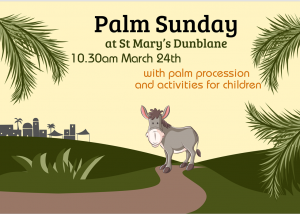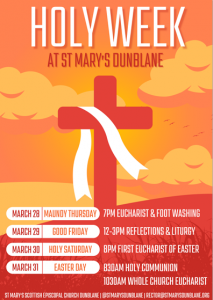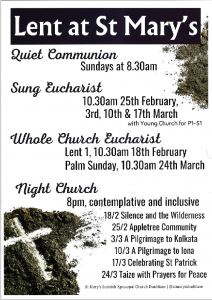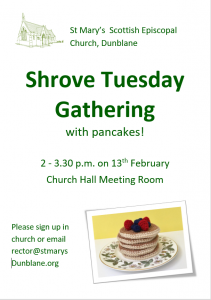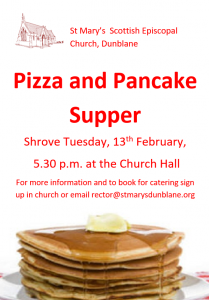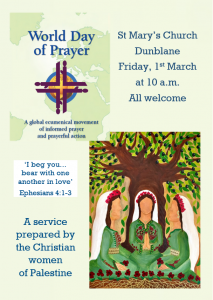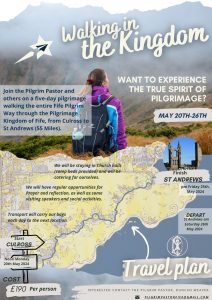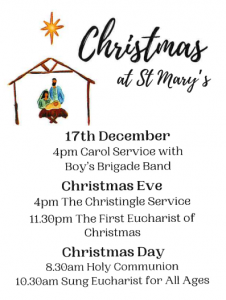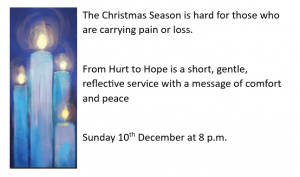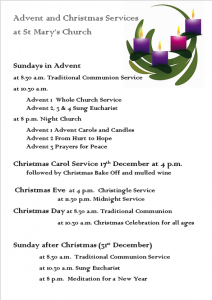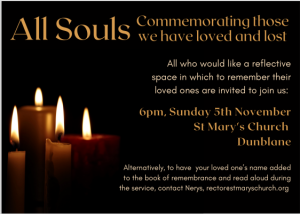Rachael writes: “Who am I?” A philosophical and existential question – one that many of us will have asked ourselves at some point in our lives – that in each of our passages today, receives a concrete answer.

Hearing our passage from Isaiah (61.1-4, 8-11) we might find ourselves transported to the synagogue in Nazareth on the Sabbath day, when Jesus is handed a scroll of scripture and opens it to this passage, reading it before the gathered crowds and essentially saying to them, “This is me”. So, of course, when we read the text in Isaiah we can’t help but think of the narrator as Christ and, in the midst of advent, as we await his arrival, of ourselves as the audience. Jesus is coming to bring me comfort and to turn my mourning into joy.
In the second half of the reading in, this first person speaker takes on another role, becoming an agent for justice. The audience for the speech disappears, and the focus turns to the exaltation of the this paragon of righteousness. The target audience in the final verse is no longer the restored community, but the foreign nations – that is, outsiders.
Our context gives us fixed ideas about where we stand in the text but on its own it doesn’t really lend itself to that. Is the speaker, the “I” of the poem, our avatar, or are we “they” whom the “I” addresses? At first glance, it might seem obvious. The speaker cannot be me, because I could not do the things that God commands the speaker to do. I cannot declare release from suffering or change mourning into joy. It is much easier to be “them,” part of the passive recipients of God’s blessings. My life is hard, I want to yell. I am mourning! I am imprisoned by poverty/poor health/addiction/anxiety. God must surely have finally heard my prayer and come to bring me my just reward!
But note that the workers, the “they” of verse 4, are the oppressed, the brokenhearted, the captives, the prisoners, those who mourn. That is, the subjects and agents of the promised rebuilding are those who have been defeated. It is the “they” who were defeated who will rebuild. The people will take part in their own restoration.
John the Baptist (John 1.6-8, 19-28) is essentially asked three times, “Who are you?”. He begins by making it very clear who he is not: not the Messiah, not Elijah, not the prophet. It’s an important reminder to us, that we are not God. We are not Christ. John says that he is one called to testify to the light. He is the voice crying out in the wilderness. And similarly, the actions that we take and the words that we speak, the restoration that we participate in, must point back toward the light and avoid being so heavily associated with us that the primary star is miscast. In community also, the action that we take as a body of believers must point back toward the light, lest “St Mary’s” become more noteworthy than the Jesus we profess to profess.
But how do we do that? Well, once again Saint Paul, in his letter to the Thessalonians (one of the earliest Christian texts to be written, around 52AD) (1 Thessalonians 5.16-24), gives us a little gem of a mandate. These are the final lines of his letter, his last charge to the church in Thessalonica. His little ten point plan for them – you can feel the urgency! It actually immediately follows verses about Christ coming like a thief in the night, an allegory which we’ve heard twice already this advent. So it’s an answer to the question of, who are we as we await Christ’s return?
We are a people who rejoice always, pray without ceasing, give thanks in all circumstances – not because there are no hardships but because even in the midst of them, God is with us. We are a people who do not quench but rather listen to the Spirit by paying attention to the prophetic, to wisdom and teaching, testing them together and holding onto what is good. In doing so, we abstain from the evil of falsehoods and those who wish to prey on a vibrant community of faith. Then our spirits, souls, and bodies, will be sound and blameless when Jesus gets here. We cannot do this on our own – God will do it in us.
Who are we? Ultimately, we, like the Thessalonians before us, are to live joyfully. Not closed off from the world but part of it, transformed by Christ. We are to be voices in the wilderness, witnesses who testify to the light, bringers of good news, proclaimers of liberty, displaying God’s glory, and building up and repairing the devastations.
And note that the question has changed. Not “who am I?” but “who are we?” for we can do none of this alone, we are united to one another through Christ, and together we joyfully serve him.
Our whole beings shall exult in our God.
Here this verse from Isaiah again:
“I will greatly rejoice in the LORD, my whole being shall exult in my God; for he has clothed me with the garments of salvation, he has covered me with the robe of righteousness, as a bridegroom decks himself with a garland, and as a bride adorns herself with her jewels.”

We wear all of this joy like our best loved outfit. I’m sure you know the one. You can remember the day you bought it – browsing the rails, spotting it and wondering if it might be the one you’ve been looking for. Pulling it out and looking it up and down, trying to picture it on. Getting to the changing room and not daring to hope that your search is over. A quick look over your shoulder in the mirror as you do it up. Do you remember the way the fabric felt, the vibrancy of the colour? Do you remember how you stood when you wore it, the little turn you did to feel the movement of it? Remember how it made you feel, the confidence it gave you – shoulders back, head high, knowing you were beautiful and handsome. And that was before you even got out the door. Then you met with friends or family and, after that initial angst that others wouldn’t see it like you do, your confidence returned and you would tell anyone and everyone that it was a new outfit, from such and such a shop, that you got at this extortionate or bargain price. Everyone, even without you having to say anything can tell that you feel glorious. There’s a light radiating from you. You emanate joy.
If we wear God’s love in the same way, who will ever need to ask, “who are you?”

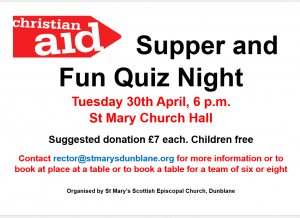
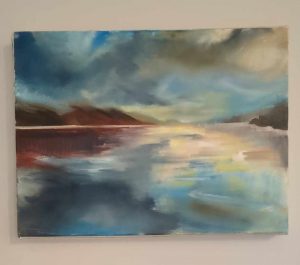 Charity McArdle cloudscape, 30x40cm oil on canvas, latest bid £100
Charity McArdle cloudscape, 30x40cm oil on canvas, latest bid £100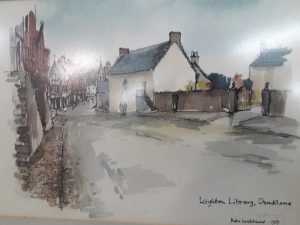 Ken Lochead, small framed watercolour of the Leighton Library 14″ x 12″ Latest bid £60
Ken Lochead, small framed watercolour of the Leighton Library 14″ x 12″ Latest bid £60 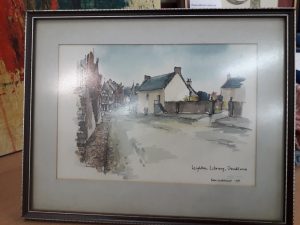
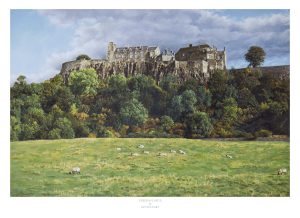 Kevin Leary, large framed limited edition print of Stirling Castle, 22″ x 26″ Reserve Price £30
Kevin Leary, large framed limited edition print of Stirling Castle, 22″ x 26″ Reserve Price £30 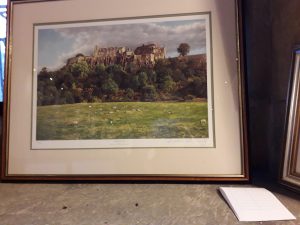
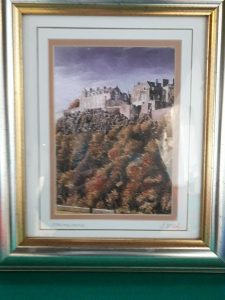 Ian McNab, small framed print of Stirling Castle 12″ x 14″ Reserve Price £20
Ian McNab, small framed print of Stirling Castle 12″ x 14″ Reserve Price £20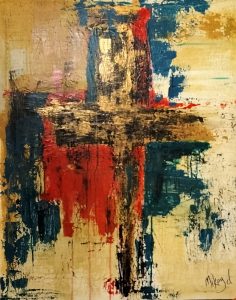 Mikey Davey, ‘Easter Cross’, oil on canvas, 28″ x 24″ Latest bid, £100
Mikey Davey, ‘Easter Cross’, oil on canvas, 28″ x 24″ Latest bid, £100 Book of Kells- style initial q, ink on paper, framed 21″ x 17 Latest bid £35
Book of Kells- style initial q, ink on paper, framed 21″ x 17 Latest bid £35 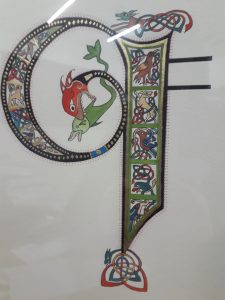
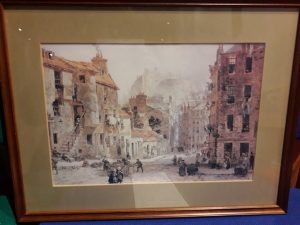 Louise Rayner framed print of ? Edinburgh 12″ x 18″ Latest bid £40
Louise Rayner framed print of ? Edinburgh 12″ x 18″ Latest bid £40